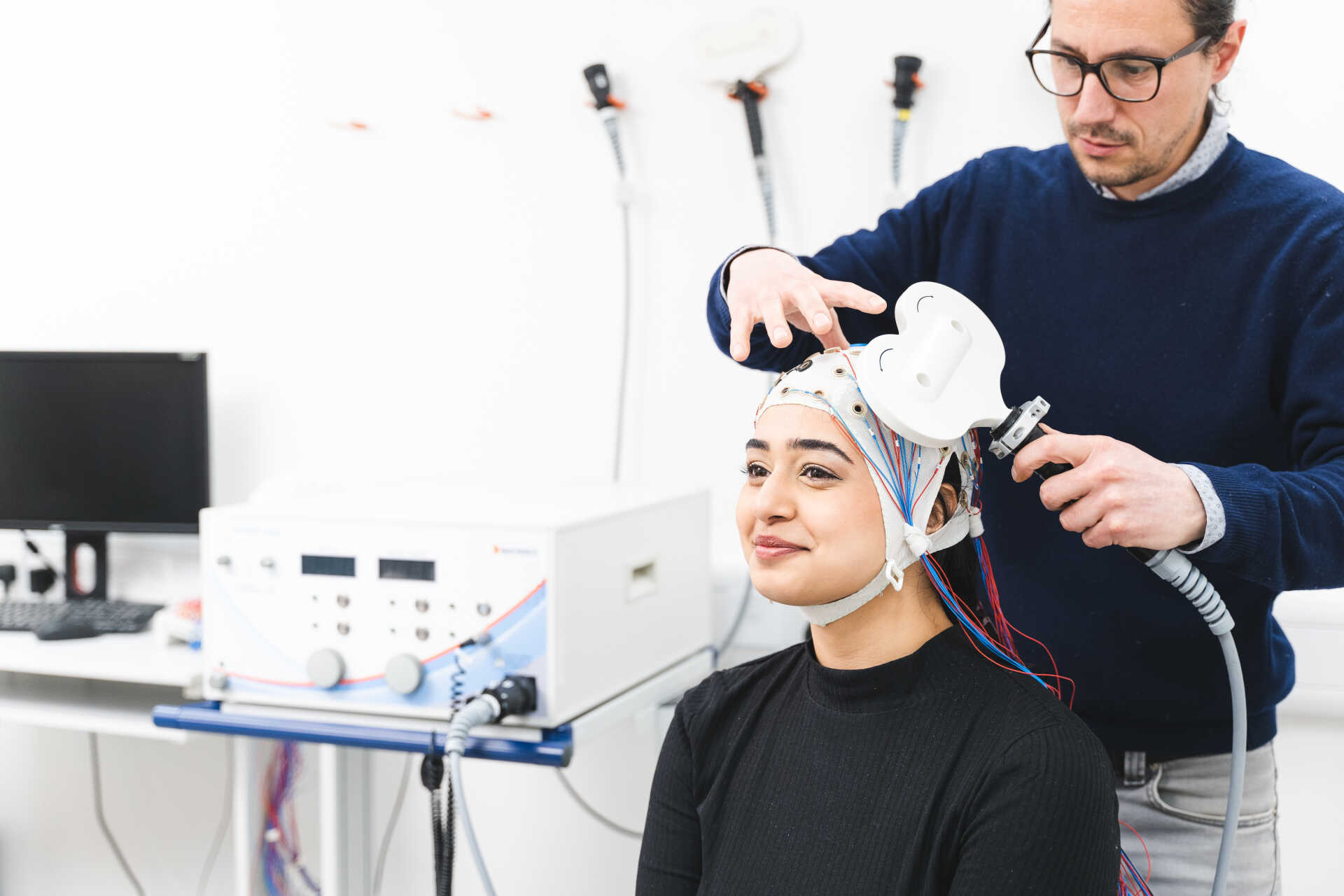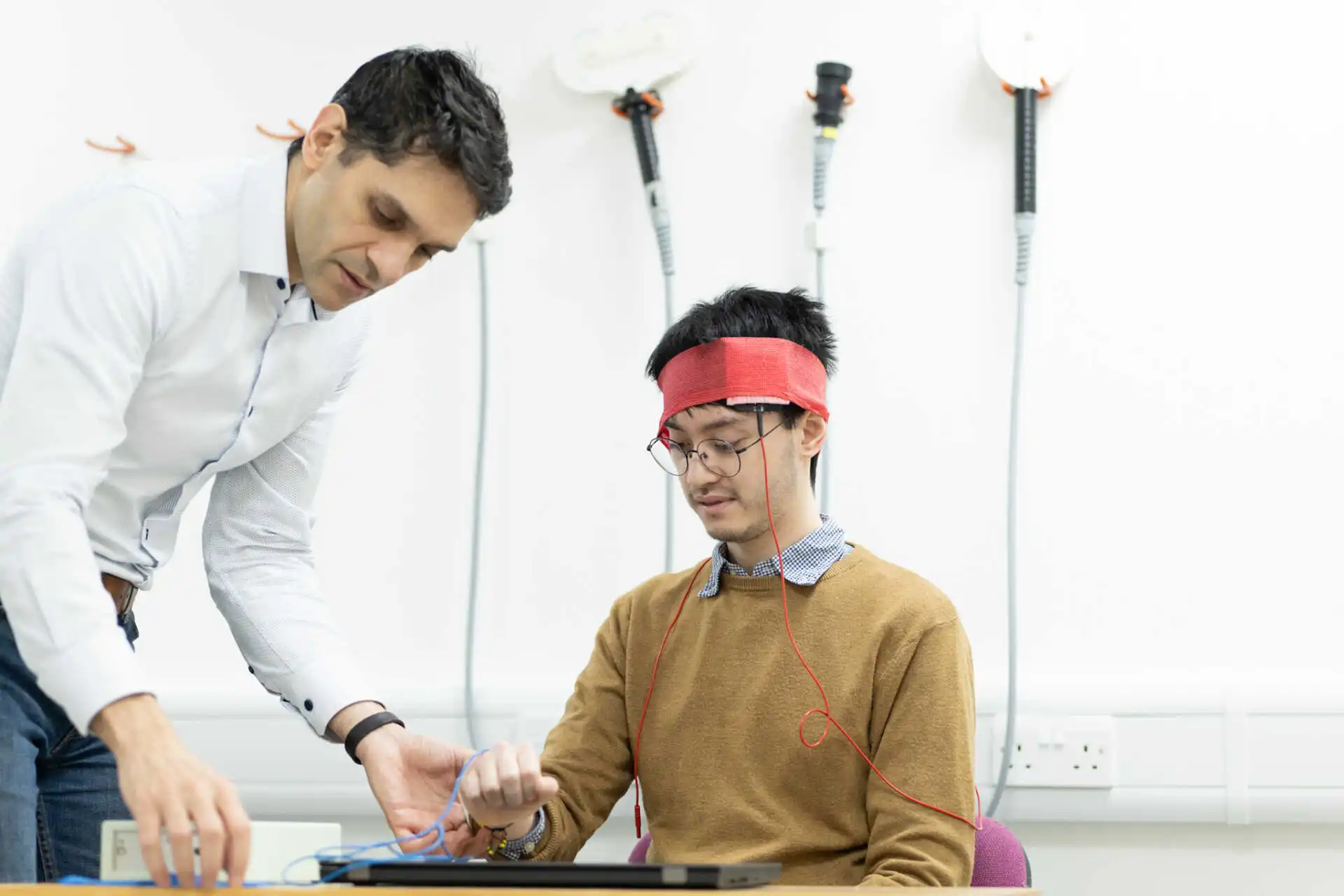Psychology with Business Psychology
Gain an understanding of human behaviour and open doors to a wide range of careers.

Gain an understanding of human behaviour and open doors to a wide range of careers.
How do people think, perceive and feel? Psychology is the scientific understanding of human behaviour that opens doors to a wide range of careers, from clinical, business and forensic psychologist to social work and roles in marketing, public relations and human resources.
Our British Psychological Society (BPS) accredited degree enables you to confront the issues that humans face with psychology's scientific principles. From brain injury to prejudice reduction, child development to offending behaviour and rehabilitation. We provide you with the tools to develop interventions for hospitals, schools and businesses, making a difference to society through innovations in policy and research.

You'll have accesss to excellent industry-standard laboratory and field research facilities as well as modern teaching spaces.
Kent ranked 16th for Psychology in the UK for graduate prospects in The Complete University Guide 2023.

Psychology alumna Rebecca Pfaff tells us how her degree in Psychology prepared her for her career as an assistant psychologist.
We have 25 years’ continuous accreditation by The British Psychological Society.

The University will consider applications from students offering a wide range of qualifications. All applications are assessed on an individual basis but some of our typical requirements are listed below. Students offering qualifications not listed are welcome to contact our Admissions Team for further advice. Please also see our general entry requirements.
ABB
Distinction, Distinction, Merit
128 tariff points - typically H5, H6, H6 or equivalent
Mathematics grade C or 4
Pass the University of Kent International Foundation Programme.
The University will consider applicants holding T level qualifications in subjects closely aligned to the course.
Obtain Access to HE Diploma with 45 at level 3 Credits with 18 credits at Distinction and 24 credits at Merit
The following modules are what students typically study, but this may change year to year in response to new developments and innovations.
What do you need to know to do well studying psychology at university? How can you best demonstrate and articulate your abilities throughout your studies and beyond? You'll gain essential information and opportunities to develop skills that will see you through the next years of your course. From academic writing to self-reflection and career planning, this modules gives you a thorough grounding in how to learn effectively and independently, and to use this learning to think and write like a psychologist.
On average you'll spend 1/3 of our life at work - yet 80% of workers admit to hating their jobs! Business Psychology (sometimes called Organisational, Work or Occupational psychology) is the study of how to apply psychology to create better workplaces and happier workers. It is one of the fastest growing fields in Psychology today.
You'll be introduced you to theories of psychology and their application to a range of workplace challenges, including recruitment/talent management; workplace motivation; mental health and well-being; leadership and teams; and Equality & Diversity. Teaching takes the form of lectures, introducing you to key theories and workshops, where you will be able to apply your learning to solving practical real world business challenges. You'll gain a sound introduction to business psychology, focusing on key theories and research (including methods), and help you begin to understand the role and importance of business psychology in creating happy, fulfilled and productive workplaces and workers.
How do psychologists generate knowledge? How can we use scientific methods to better understand human behaviour? In this module, you will learn the essentials of the scientific method, and how we can use this to design psychology experiments effectively. Through a critical examination of classic studies in psychology and seeing how they can be updated with modern methods, you will develop essential critical thinking skills that will help you understand the history and future of the study of psychology. This module will help you understand how to operationalise and measure variables, and how different types of data can be analysed.
You'll start on an in-depth journey into cognitive and biological psychology, introducing you to the foundational theories, methodologies, and critical issues within these fields. Starting with the history and development of psychology as a science, you'll navigate through the complexities of the brain and nervous system, delving into the cognitive processes behind learning, memory, and decision-making, and explores the realms of sensation, perception, and multisensory integration.
Students will also examine the nuances of psychopathology, including the nature and treatment of psychological disorders, and the psychological aspects of social cognition, sleep, and dreaming. Through a blend of historical context and contemporary research, you'll be equipped with a thorough understanding of the mechanisms underlying human behaviour and mental processes, laying a solid foundation for further study in psychology.
Each lecture within the module is designed to not only impart theoretical knowledge but also to encourage you to critically engage with current research, methodologies, and debates in the field of psychology. Through this comprehensive programme, you are equipped with a deep understanding of the cognitive and biological bases of human behaviour, preparing you for further study or careers in psychology and related disciplines.
A fundamental part of being a psychologist is using data to get answers to questions about how people think and behave. You'll build on what you have learned about psychology and science in Research Methods – Science and Psychology, exploring how to use generic and specialist software to produce descriptive statistics and test hypotheses. You'll also learn how to present your findings in graphical and written form in line with professional requirements to allow you to communicate your findings to a range of audiences. You'll develop an understanding of which types of tests can be used on which types of data, and what conclusions can be drawn from these tests. These essential skills will help you to think and communicate like a psychologist.
Why are some people attracted to each other? Why are some of your friends more open to persuasion than others? What motivates people to help or harm others?
Learn how people think, feel and act in relation to themselves, others, and the world around them. From personal choices to group conflicts, you'll gain a solid understanding of people and groups, and learn about the psychological underpinnings of the brighter and darker sides of human nature. Using fascinating real-life examples, we'll introduce you to classic concepts and research as well as emerging areas in personality and social psychology. You'll learn about their relevance to everyday life, and inevitably, you'll learn something about yourself, as you develop the ability to critically reflect upon psychological ideas and research findings and identify some of the most pressing questions related to human behaviour and the social world.
How do our early experiences shape us into the people we are today? Are we simply a product of our genetics or does the environment we grow up in impact the way we think and behave?
You'll gain knowledge of the crucial factors that influence us from before birth, through infancy and childhood, and into adolescence. Through engaging with key theories and methods you'll gain an in-depth understanding of how biological and cultural factors impact every child’s development, alongside developing key skills for a career in Psychology or further afield.
We spend 90,000 hours at work over the course of a lifetime, so one thing we all want is a happy, healthy and productive workplace! Business Psychology (sometimes called Organisational, Work or Occupational Psychology) is becoming increasingly important in supporting workplaces in achieving this.
You'll be introduced to important concepts in Business Psychology, such as Positive Psychology, Nudge Psychology, Decision-Making in Teams, Navigating Diverse Work-groups, Ethical Leadership and AI/Automation in the workplace. Skills development (e.g. building your personal brand, reflective practice, writing for a non-academic audience) is also an important part of this module. Teaching takes the form of lectures, covering key concepts; and workshops, where you work in groups to read and critique an empirical article on a ‘hot’ topic in Business Psychology, and lead a short in-class discussion with your fellow students.
This module develops your understanding of Business Psychology, taking you beyond the ‘buzz words’, to develop your understanding of key business psychology concepts and the practical skills you will need as an aspiring business psychologist.
In Conducting, Using and Evaluating Research, you will gain experience of the research process from data collection through to the production of professional-standard research reports. You will have the opportunity to work on both qualitative and quantitative data, and to understand the different ways in which these can be used to answer fundamental questions about human behaviour. Building on Making Sense of Psychological Data, you will continue to learn how to apply and interpret statistical tests that will allow you to ask and answer more complex and interesting questions. You will also develop essential skills around the critical reading of scientific research to help you write your practical reports.
How do we study the brain and how it relates to cognition and behaviour? This module gives you grounding in methods, techniques and issues in cognitive neuroscience. It will focus on the biological bases of human behaviour (neural development and plasticity; anatomy and physiology of the nervous system), and on key cognitive processes such as perception, memory and higher levels of cognition with a particular focus on how these processes are instantiated in the brain.
You'll learn about the methods used to study and modulate these processes, such as the recording of physiological signals, brain-imaging, brain stimulation and psychopharmacology. During the seminars you'll gain familiarity with key contemporary research topics and methods in Cognitive and Biological Psychology and develop fundamental critical reflection skills through the discussion of scientific research articles. You'll have the opportunity to train in verbal presentation, a core skill to learn not only in academia but in almost all graduate careers.
You have the option to add a year in industry to this course. We already know you have the confidence and commitment to thrive in the workplace and kick-start your career. This is your chance to prove it, to yourself and to employers.
When should I start looking? In the summer of your first year; placements must be secured by 31 August in your second year.
Where can I get help finding a placement? Book an appointment with a placement adviser via the careers service.
Will I get paid? Most of our placements are paid.
Do I have to pay tuition fees? Yes, you’ll pay a substantially reduced fee, currently £1,850, which for UK students is covered by Student Finance.
Where can I get visa advice if I’m an international student? Kent Union can help with any visa queries for your Year in Industry.
Does the University keep in touch? You receive four-weekly check-in emails, a visit from the team every three months and you can reach out to us any time by email or phone.
Do I work for a full year? The minimum requirement for an industrial placement is 44 weeks.
What could you do in a year?My year in industry couldn’t have gone better. I secured a role at IBM, working in their sports and entertainment department – it was perfect for meTom Tillin Find out more
Taking a year abroad – whether you study at one of our prestigious partner universities or do an internship – is an amazing opportunity.
Is there any additional funding for the year abroad? You may be able to apply for funding; check with our Go abroad team.
Do I have to pay tuition fees for the year abroad? Yes, you pay a substantially reduced fee, currently £1,385, which for UK students is covered by Student Finance. You don’t pay anything to the host uni.
Will I still get my maintenance loan? Yes.
When does the year abroad take place? Between your second and final year.
Do I have to learn a foreign language? You’re taught in English in many destinations, but you’ll get more out of your year if you learn the local language.
Does the University keep in touch? You have full access to all Kent’s support services as well as our dedicated Go abroad team.
Where could you go in a year?
My ‘You only live once’ decision to study in Japan is one of the best I’ve ever made. I had a fantastic year.Cheyenne Nolan Find out more
Psychological tests from diagnostic measures, to personality tests, to tests of cognitive function have wide-ranging applications in areas including business, health, education and the law. They can be used to inform interventions at the individual, group, organisational and social levels, and are among the most important tools used by professional psychologists. You'll be introduced to some key psychological tests and learn how they can be used in real-world situations. You'll gain an understanding of how they are administered and scored, as well as developing a critical perspective on their use. You'll also learn how to make recommendations based on the results of these tests, and to propose interventions related to them. Learning how to apply psychological concepts and tests is an essential employability skill for anyone looking to work within the field of psychology.
The Business Psychology Project is the capstone of your degree, as you bring together what you have learned in the first two years of your studies to produce a thorough, professional research report relevant to business and organisational psychology. You'll evaluate existing evidence in your chosen area, develop your hypotheses and research questions, and select and run appropriate statistical tests to answer these questions. You'll then present your findings in an accessible and professional style, and discuss how they fit within and build on psychological knowledge relevant to the fields of business, organisations and work. Research reports are the fundamental tool of communication in the sciences, and producing your own is an exciting opportunity to join the scientific community in making valuable contributions to key discussions in the field of business psychology.
On average you'll spend 1/3 of our life at work - yet 80% of workers admit to hating their jobs! Business Psychology (sometimes called Organisational, Work or Occupational psychology) is the study of how to apply psychology to create better workplaces and happier workers. It is one of the fastest growing fields in Psychology today.
You'll be introduced you to theories of psychology and their application to a range of workplace challenges, including recruitment/talent management; workplace motivation; mental health and well-being; leadership and teams; and Equality & Diversity. Teaching takes the form of lectures, introducing you to key theories and workshops, where you will be able to apply your learning to solving practical real world business challenges. You'll gain a sound introduction to business psychology, focusing on key theories and research (including methods), and help you begin to understand the role and importance of business psychology in creating happy, fulfilled and productive workplaces and workers.
Dive deep into the theories and real-world applications of forensic psychology. You’ll explore how forensic psychology is used extensively within the Criminal Justice System, examining how it sheds light on criminal behaviour, aids in victim recovery, and informs court decisions.
You explore and critically analyse the latest research methods and findings in forensic psychology. You’ll consider research on the policies and practices that inform the Criminal Justice System, focusing on how psychology impacts the professionals, victims, and people who offend. Develop the skills to effectively critique this research, gaining a strong grasp of core forensic psychology issues. By the end of the module, you will be equipped to critically evaluate this ever-evolving field and its impact on all parties involved, making you better placed to succeed within it.
To what extent are our thoughts and actions shaped by processes outside our awareness? Are we wrong to believe that we can act out of free will? You'll explore these questions to tackle a variety of current and/or critical topics in cognitive psychology/neuroscience.
The overarching theme focuses on free will and metacognition, looking in particular at the extent to which we control, or feel we control, our thoughts and behaviour. You’ll discuss research that has used a variety of methods, including behavioural, animal and neuroimaging techniques. Practical applications and relevance to everyday understanding of behaviour is emphasised throughout. You will learn how to evaluate pieces of original research in terms of their findings, conceptual underpinnings and/or methodological choices. This will enable you to gain a deep understanding of the topic areas as well as important communication and critical analysis skills.
We are all unique, so why do we assume our experience and understanding of distress would be the same? How do factors like culture, religion or gender influence people’s perceptions of distress? What do cultures around the world have to say about the causes of distress and how we treat it?
Clinical Psychology practice and research have been criticised for being Eurocentric, individualist and focusing heavily on intra-psychic intervention. Research tells us that our current practice doesn’t work for everyone, so what are some of the alternatives? You’ll explore understandings of distress from other countries, other psychological perspectives (e.g. social justice approaches) and how individual factors such as religion, sexuality and culture may influence people’s perceptions of distress. This holistic approach and widened understanding makes you a better practitioner, able to serve more people and offer them more relevant and effective support.
For students interested in further study, or a research career, this module offers an opportunity for you to get experience of data collection at an advanced level. You will work in a research team under the supervision of an academic to collect data for your psychology project.
Working as part of a research team will allow you to develop professional and research skills ideal for further study. The exact nature of the research you undertake will vary depending on the project, but will likely require lab-based data collection. You will undertake supervision as a group, and work together to identify and evaluate evidence relevant to your project. This skills you develop through working in a research team help you stand out to employers, in whichever field or career you want to explore.
Modules are taught by weekly lectures, workshops, small group seminars and project supervision. The Psychology Statistics and Practical modules include laboratory practical sessions, statistics classes, computing classes and lectures in statistics and methodology.
Most modules are assessed by examination and coursework in equal measure. Both Stage 2 and 3 marks count towards your final degree result. Our assessment methods are varied and will include, but are not limited to, examinations, written assignments and essays, group work and oral presentations
For a student studying full time, each academic year of the programme will comprise 1200 learning hours which include both direct contact hours and private study hours. The precise breakdown of hours will be subject dependent and will vary according to modules.
Methods of assessment will vary according to subject specialism and individual modules.
Please refer to the individual module details under Course Structure.
For course aims and learning outcomes please see the coursee specification.
Our graduates currently have excellent graduate employment prospects, working in clinical, forensic and occupational psychology or in allied fields related to therapy, teaching, or social work. Many work in communication-focused roles in marketing, public relations and publishing.
If you choose an undergraduate programme with a placement year you can spend a year working with professional psychologists in, for example, the NHS, the Prison Service or another government agency or in a business setting and gain experience that will enhance your employability.
The University will assess your fee status as part of the application process. If you are uncertain about your fee status you may wish to seek advice from UKCISA before applying.
For details of when and how to pay fees and charges, please see our Student Finance Guide.
Fees for undergraduate students are £1,900.
Fees for undergraduate students are £1,430.
Students studying abroad for less than one academic year will pay full fees according to their fee status.
Students will require regular access to a desktop computer/laptop with an internet connection to use the University of Kent’s online resources and systems. Please see information about the minimum computer requirements for study.
Find out more about accommodation and living costs, plus general additional costs that you may pay when studying at Kent.
Kent offers generous financial support schemes to assist eligible undergraduate students during their studies. See our funding page for more details.

We have a range of subject-specific awards and scholarships for academic, sporting and musical achievement.
Kent provided me with an all-rounded experience that moulded me into the practitioner that I am today.

We welcome applications from students all around the world with a wide range of international qualifications.

Student Life

Powered by progress
Kent has climbed 12 places to reach the top 40 in The Times Good University Guide 2025.
Kent Sport
Kent has risen 11 places in THE’s REF 2021 ranking, confirming us as a leading research university.

An unmissable part of your student experience.